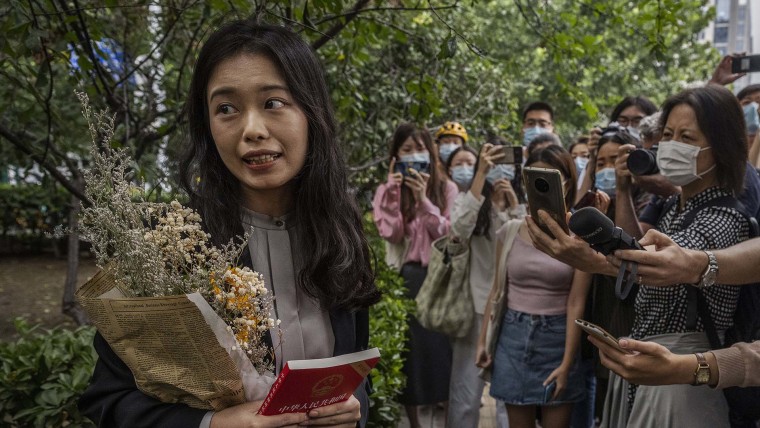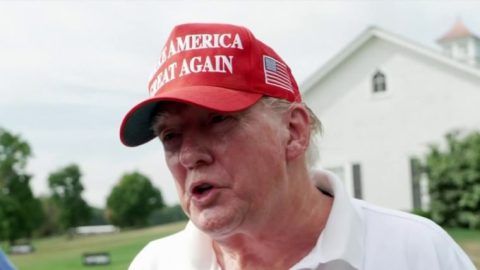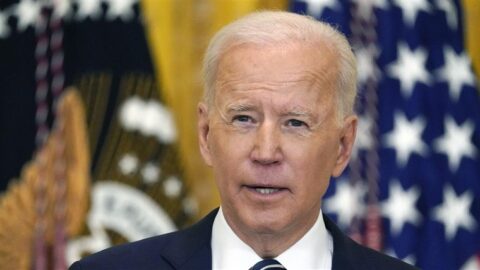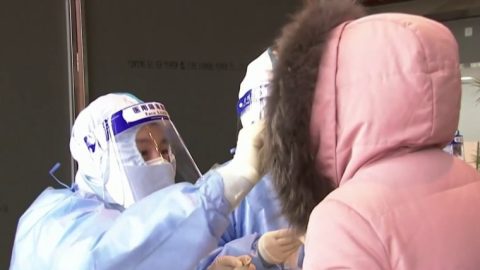China is facing its most explosive #MeToo storm to date after one of its biggest tennis stars alleged online that she had been sexually assaulted by a retired senior official in the ruling Communist Party.
The country’s internet censors swiftly tried to scrub any mention of the issue by blocking certain search terms and recent mentions of the people allegedly involved.
On Tuesday night, a long message detailing the allegations was posted on the verified Weibo social media account of professional tennis player Peng Shuai, 35. It was deleted within minutes but screen grabs have been widely shared, including by Bill Bishop, who writes the influential Sinocism newsletter and confirmed to NBC News that he saw the live post before it was removed.
NBC News did not see the post before it was deleted from Peng’s account, which has more than half a million followers. It was not clear whether she deleted the post or whether it was done by China’s censors.
Peng, who was once ranked world No. 1 in doubles tennis, said in the message that she was sexually assaulted during an otherwise consensual, on-and-off affair with Zhang Gaoli, a former vice premier who served on China’s Politburo Standing Committee and was one of the country’s most powerful officials behind President Xi Jinping.
The Information Office of the State Council, China’s ruling administrative body, has not responded to requests for comment on the allegations.
Zhang is one of the most senior officials in the Chinese Communist Party in recent years, and as such his contact details are not publicly available, so he could not be contacted directly.
The Chinese Tennis Association did not immediately respond to a request for comment. It is not clear who manages or represents Peng and no one from her team could be contacted.
Asked about the matter Wednesday at a regular press briefing, China’s Foreign Ministry spokesman Wang Wenbin said he was “not aware of it” and that it was “not a diplomatic question.”
It is not the first time a high-profile figure in China has been accused of sexual assault following the #MeToo movement that swept the world in 2017. But never before have such allegations been leveled at such a powerful former official in the country’s one-party state.
In the now-deleted post, which did not include a clear timeline of events, Peng said she had consensual sex with Zhang, who is married, several times over the past 10 years. But she said one of these occasions was nonconsensual. She did not say exactly when the alleged assault took place and said she was unable to provide evidence of her allegations.
“That afternoon, I was very afraid. I didn’t expect it to be like this,” she said in the post on Weibo, a Chinese social media platform similar to Twitter. “I didn’t agree to have sex with you and kept crying that afternoon.”
It’s not clear why Peng’s allegations emerged now, but they come at a politically sensitive time for the Communist Party, which is holding a key meeting in Beijing next week. The event is crucial to Xi’s plans to secure an unprecedented third term at next year’s party congress, which takes place every five years.
This week, internet searches or comments about the alleged assault were blocked on Weibo, and users were unable to search for Peng’s profile or comment on her previous posts. The word “tennis” was also censored, meaning the platform’s 500 million-plus users were not able to directly discuss the sport at all.
Zhang, who is 75 or 76, served as China’s senior vice premier from 2013 to 2018 and was a member of its top leadership, the seven-member Politburo Standing Committee, during that time.
The inner working of China’s government is rated by watchdogs as one of the most opaque in the world. It places severe limits on freedom of speech, especially when it comes to criticism of the Communist Party and its senior officials.
“The censorship only helps to reveal the fear of Chinese top leaders.”
“These allegations are not shocking in substance but are shocking in the target,” Bishop said in his Sinocism newsletter, calling it “a remarkable accusation.”
The #MeToo movement began sweeping the world in 2017, set off by allegations of sexual assault against Hollywood movie producer Harvey Weinstein. It spread to China when a Beijing college student accused her professor of sexual harassment, despite attempts by government censors to limit the discussion online.
Activists got around the removal of certain hashtags, such as #MeTooInChina, by using homophonous codewords, a trick long practiced by those looking to circumvent the censors. The Chinese characters for “rice” and “bunny,” which sound like “mi” and “tu,” got about 5 million clicks in early 2018 before being removed as well.
The impact of the #MeToo movement in China has been “unprecedented,” according to a blog post by Lü Pin, a prominent Chinese feminist now based in New Jersey.
“What stands at the core of this battle is the courage of the victims/survivors who speak up and powerfully shake up many others in society,” she wrote. “Their disclosures have created a ripple effect, inspiring more and more victims/survivors to stand up and speak up compellingly.”
Lü added, “The censorship only helps to reveal the fear of Chinese top leaders.”
More recently, the most high-profile case involved an intern who accused a prominent television personality at China’s state-run broadcaster CCTV of groping and forcibly kissing her in 2014.
A court said in September that there was insufficient evidence and ruled against the plaintiff. The veteran host, Zhu Jun, is countersuing his accuser for defamation.










Recent Comments